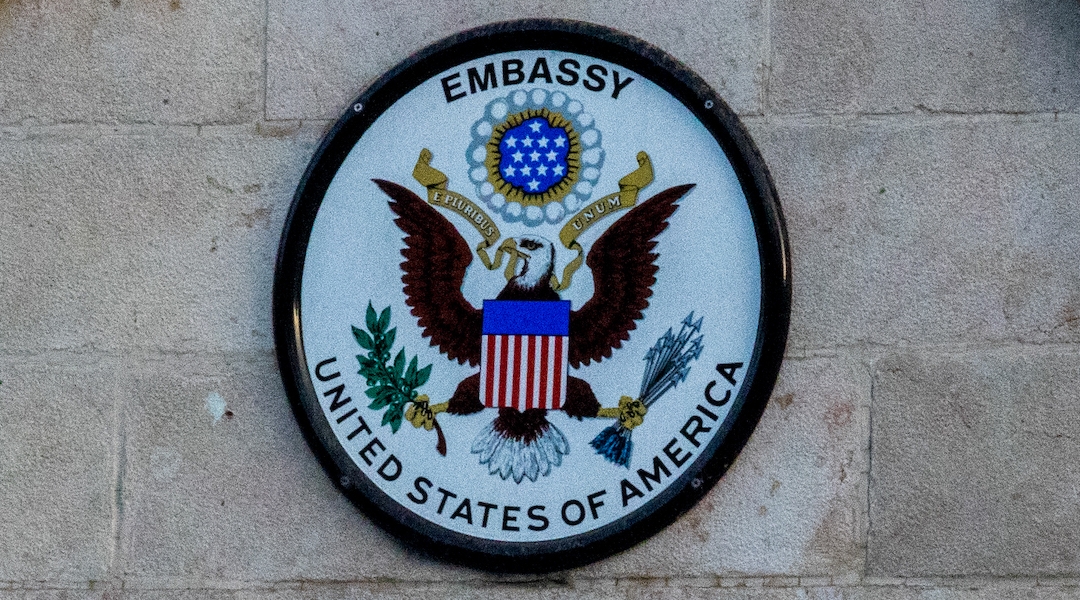TEL AVIV (JTA) — Bar Shelly is hoping that the fourth time’s the charm when it comes to gaining entry into the United States. The 24-year-old first applied for a visa in 2019, shortly after his release from the Israeli military. He tried again in 2021 and 2022 and was refused each time.
People from 40 countries can enter the United States without a visa. But Israelis without other passports must apply for a visa online and then go through an interview at the consulate in Tel Aviv. One goal of their interviews is for consular officials to make sure they are not admitting people who intend to stay illegally after their visa expires.
Shelly brought ample evidence to his interview showing that he planned to return to Israel: his acceptance letter to an Israeli college, an invitation to an upcoming wedding of a close family relative and pay stubs from his job as a tennis coach. Still, he received a rejection letter saying that he did not demonstrate “strong ties overseas that indicate [his] return” from the United States to Israel.
“I brought all the documents and they didn’t even want to look at them,” Shelly told the Jewish Telegraphic Agency in an interview last month.
Undeterred, Shelly applied again and still hopes to make it to watch the U.S. Open in early September. He is part of a Hebrew-language Facebook group with several thousand members who have shared their frustrations with the lengthy and strenuous process they were required to undergo in order to visit the United States.
Like many other Israelis, they are hoping that the path will get easier soon, if the United States decides to approve Israel’s request to join its Visa Waiver Program. Acceptance into the program would add the United States to the list of 126 countries that Israelis can enter without a visa — and Israel could get the green light if it meets all of the requirements by Sept. 30.
“This will simplify the bureaucracy and make the process more accessible,” said Yacov Amsalem, whose tourism firm helps facilitate U.S. visas for Israeli customers. About 70% of these visa requests are for tourists seeking to visit the United States.
While Shelly and thousands of others have complained about rejections at the U.S. consulate, they are in a small minority. Some 97% of Israelis who apply for U.S. visas receive them. Still, the Israeli government has made entering the program a priority, endeavoring to satisfy U.S. State Department demands that Palestinian-Americans who travel to Israel will be able to enter the country with the same ease as other U.S. citizens.
Entry into the program may also be a boon for rank-and-file Israelis who have chafed at the visa application’s fees of at least $160, and the months of waiting and uncertainty they often must endure. Some say that entry into the program — and the elimination of the visa application process — will serve as a symbol of a strong U.S.-Israel relationship in addition to removing a bureaucratic headache.
“To say I have no visa is one thing, but to say I was refused a visa is another story,” said Or Amran, a gemstone seller who has demurred from applying for a visa because he fears the stigma of rejection. “I’ve seen all of Asia. It’s funny that I’ve never seen America, which is supposed to be Israel’s greatest friend.”
Amsalem said the 97% visa approval rate left out some people who haven’t even tried to get a visa to the United States. “In the past, there were many people who were afraid of going through the visa process, which includes personal interviews,” he said.

Or Amran says having a visa application rejected comes with a stigma. (Courtesy of Amran)
Some Israelis whose applications have been rejected have complained of demeaning treatment at the consulate. A visa applicant who asked to be identified by the name Veronika, fearing reprisal from U.S. authorities if she uses her real name, paid a visa processing company more than $400 in addition to the $160 fee to secure an expedited appointment. She hoped to fulfill her teenage daughter’s dream of attending summer school in the United States.
The two woke up at 4 a.m. to make the long journey from the northern coastal city of Nahariya to Tel Aviv in time for the appointment. When they got there, Veronika said, they met with an embassy agent who seemed angry even before they entered his booth. Thrown by his demeanor, Veronika said she mixed up the dates of her daughter’s travel and found herself being cross-examined by the clerk.
“I was crying and really scared of him,” she said, adding that she was told the visa request was denied. “We didn’t understand why. I begged for someone to explain but they kicked us out of the consulate like dogs.”
Veronika later received a letter explaining that she had not provided enough proof that her daughter planned on coming back to Israel, despite a letter from her daughter’s school.
“She’s my only child, why would I send her there forever?” she said. “After this, I don’t want to go to America ever. I don’t want to meet people like that ever again.”
A spokesperson for the U.S. embassy in Israel declined to comment on Veronika’s case or other Israelis’ claims about their experiences at the consulate, characterizing them as private interactions.
Israel’s quest to join the Visa Waiver Program has been at the forefront of U.S.-Israel relations. One of the last sticking points has been easing entry of Palestinian-Americans in and out of Israel. Israel is piloting a program allowing Americans of Palestinian origin to enter the country through Ben Gurion Airport, rather than overland through Jordan and the West Bank, as they are required to now.
Groups of U.S. lawmakers have sent dueling letters on the issue: One urges the U.S. to find a compromise that would allow Israel into the program by the deadline of Sept. 30. The other asks the government to keep Israel out.
To date, Israel has not met the requirements and still has “significant work” to fulfill them within a short timeline, a U.S. embassy spokesperson told JTA. In the coming weeks, Israel would need to prove it could extend “reciprocal privileges to all U.S. citizens and nationals, including allowing Palestinian Americans to travel to and through Israel.”
“We seek equal treatment and freedom to travel for all U.S. citizens regardless of national origin, religion, or ethnicity,” the spokesperson said.
As the situation has remained uncertain, Amran, the gemstone dealer, went to great lengths to help Israel enter the visa program. He decided to fly back to Israel to vote in the November 2022 election for the Yamina party, which was headed by Ayelet Shaked, because she had worked on legislation aimed at meeting the visa program’s criteria.
But Shaked’s party did not get enough votes to enter Israel’s parliament, the Knesset. According to Amran, his family still makes fun of him for “wasting his vote” on her.
Rubi Segal’s hopes of flying to the United States serving as the sandak, or godfather, at his American nephew’s bris circumcision ceremony over the summer were dashed with the receipt of a letter last month declaring that the U.S. consulate had “adjudicated and refused” his visa application — with no explanation given.
“I’m not able to pull myself out of this depression. Truly. I also don’t understand why it happened. I’m so sad to miss my brother’s [son’s] bris,” Segal said. “I’m the most normal person in the world — there’s no way they think I want to stay there. I have business here, I own a home, a wife and kids, no debt, no criminal record, I just don’t understand the reason.”

Bar Shelly is on his fourth round of visa applications. (Courtesy of Shelly)
Even if Israel is accepted to the Visa Waiver Program, Segal would still need a visa and an interview. The visa waiver will not apply to anyone who has been denied entry.
Other Israelis are in wait-and-see mode, hoping that within months they will be allowed to skip the unpleasant experience at the U.S. consular office on their way to America.
Shay Rimo, 39, never bothered applying for a visa. “I’ve wanted to go for many years but it just never made sense to pay the money — which isn’t a negligible amount — and go through the whole process. So I always pushed it off.”
Rimo’s sister lived with her now-husband in the United States for three years when they were students, but because of the visa process, none of the family ever went to visit them.
“The second it opens up, I’ll go,” Rimo said. “In the meantime, it’s better to just go to Thailand.”
JTA has documented Jewish history in real-time for over a century. Keep our journalism strong by joining us in supporting independent, award-winning reporting.






